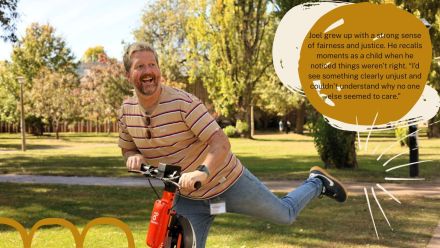Grant awarded for digital stories in dementia care
The life stories and personalpreferences of individuals living with dementia in aged care facilities will be recorded as part of a four-year $1.35 million project to help provide them with more personalised care and support.
The project will educatehealthcare students to conductreminiscence sessionswith individuals living with dementia in residential aged care. Students will use a range of resources to evoke memories and stories from the individual's past.The students will then produce a four-minute life story video and poster to capture the resident's identity and preferences. The video will be easily accessible through a QR code on the poster.
The research team will compare this approach with usual care to find out if the life story videos help aged care and health staff understand more about the resident so they can provide personalised care and support.
Chief Investigator, Dr Katrina Anderson from the Aged Care Evaluation Unit (The Australian National University and Southern NSW Local Health District) anticipates that this will improve the quality of life of the residents and their family carers.
"This project was born out of our clinical experience in aged care homes. Time pressured care staff often have little information about the person behind the disease when individuals living with dementia first relocate to residential care," Dr Anderson said.
"Sometimes a small piece of information about the resident's life can help staff to head off distressing interactions; knowing someone has a fear of dogs, for example, can change the activities offered to that person."
The study evolved from long-standing partnerships with community members with experience of the aged care system, as well as aged care providers Sapphire Coast Community Aged Care and Warrigal. Advice on translating the project into usual practice will be provided by the Aged Care Quality and Safety Commission and the Australian Commission on Safety and Quality in Health Care.
"If they had something like this when my mother was in care, it would have made the world of difference," consumer representative Elaine Todd commented.
More than 50 per cent of residents in aged care homes currently have some form of cognitive impairment, usually dementia.
These individuals often enter care with little warning and may transition rapidly between the care home and hospitals. The research team hopes the short videos will assiststaff in any setting to quickly get to know the person with dementia and what works for them.
The four-year, $1.35 million Medical Research Future Fund Dementia Ageing and Aged Care Grant has been awarded to a team of researchers from The Australian National University (ANU), Swinburne University of Technology, The University of Sydney, University of Wollongong, The University of Queensland and Southern NSW Local Health District.


